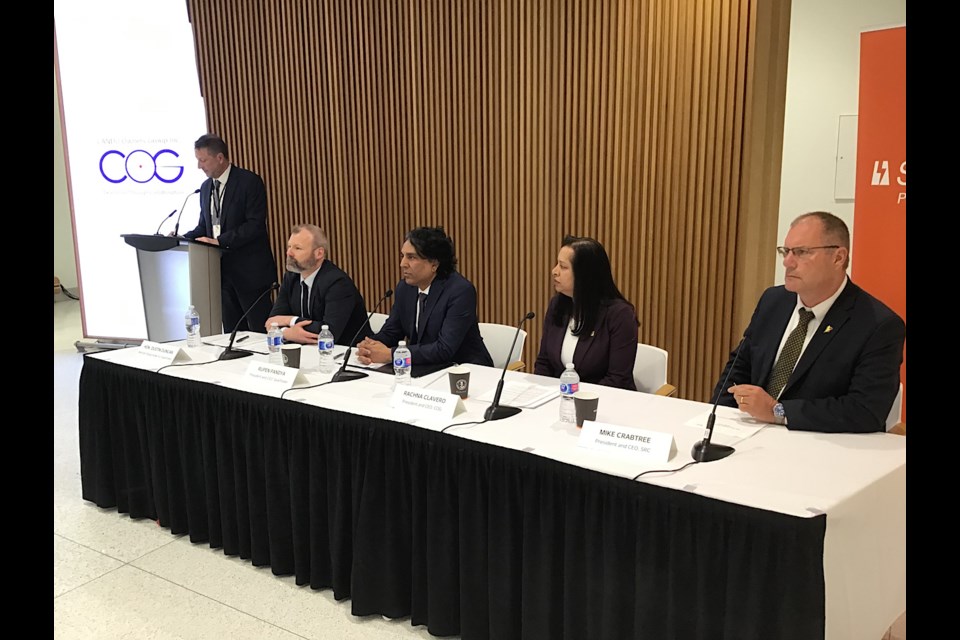REGINA - Saskatchewan took another step forward towards a nuclear power future with the announcement Monday that SaskPower and the Saskatchewan Research Council have joined CANDU Owners Group as members.
Other Canadian organizations involved in COG include Ontario Power Generation, Bruce Power, New Brunswick Power and Canadian Nuclear Laboratories. SaskPower and the SRC are the first new members of COG in over two decades, said COG President and CEO Rachna Clavero.
"As Saskatchewan looks at developing nuclear energy options, SaskPower and SRC nuclear’s membership in COG will provide them with decades of operating experience, research and development, and to a network of experts across the industry,” said Clavero.
According to the province’s news release, both SaskPower and SRC will gain access to research, technical workshops and peer groups focused on environmental and regulatory affairs, nuclear safety, used fuel management and emergency planning.
SaskPower will be making a three year commitment of $600,000 for this access. But they have been participating in COG's SMR Technology Forum since 2019, and collaborated with Canadian nuclear utilities on various topics through that.
SaskPower and Saskatchewan Research Council are joining COG at an important juncture, as the province considers whether to move forward with small modular reactors. SRC is currently pursuing licensing and demonstration for a microreactor in the province, and SaskPower is considering two locations as potential sites for an SMR — Estevan and Elbow. Rupen Pandya, CEO of SaskPower, indicated that they continue to do onsite evaluations and says he thinks they would be “ready by the end of the summer if not earlier with respect to the narrowing of the two regions with respect to potential further work to select a specific site.”
Minister Responsible for SaskPower Dustin Duncan was asked about the decision of whether or not to pursue SMRs by 2029 at the news conference at SaskPower on Monday.
"I think there’s a lot of work that has to be undertaken by SaskPower looking at whether or not nuclear through an SMR is the right path for the province," said Duncan.
“We’re looking to really to partner and collaborate, we’ve done so with our MOUs with our neighbouring provinces in Ontario and New Brunswick to work together to share information. This is just the next extension of that work, just ensuring we have that collaboration, that we meet with people that really have the expertise, they have the understanding, the knowledge, the experience, and so this is really the primary technical group in Canada when it comes to provide SaskPower and SRC with that knowledge and expertise, so we’re looking to leverage that in this agreement going forward.”
“We’re in year three of an eight year process,” said Pandya. “As you can imagine, the decision to deploy nuclear technology is an important decision. We want to make sure that we are doing our due diligence with respect to the question, and certainly we are availing ourselves of the expertise and the technical knowledge and CANDU Owners Group will aid in that decision making process.”
Duncan also said this move would aid in the energy security of the province.
“Through SaskPower we have indicated that first and foremost, this province is a growing province, both in population and economic growth. It’s through the strength of this economy that we need to ensure that we have the power that the people of this province and businesses in this province will need for decades going forward. We are looking at deploying SMR’s as a part of the baseload power demands and supply for decades to come. So this is really a part of ensuring that we can provide that energy security for the people and businesses that are here today and looking to be here well into the future.”
When asked if the province would still be pushing ahead with this even if the federal government were to change, Duncan replied that “regardless of what happens at the federal level, SaskPower needs to continue to do its due diligence as to whether or not small modular reactors is going to be a part of the energy mix in Saskatchewan going forward.”
Speaking to reporters at the Legislature later on Monday, SaskPower Critic Aleana Young was cautiously optimistic about the announcement but still had questions of what it meant going forward, particularly around transparency.
"It's nice to see some collaborative announcements happen, and I think, looking at lessons learned and expertise from industry and from other leaders in Canada makes sense for SaskPower, but when it comes to some of the Minister's questions about this 小蓝视频 another important milestone in bringing nuclear power generation to Saskatchewan, I think that's where most people have a lot of questions," said Young.
"We've been clear on this file. As far as nuclear power might end up 小蓝视频 a good option -- the option for baseload generation here in Saskatchewan -- but it's impossible to tell. There's no clarity around financial information, which is significant when we're talking about anywhere from $5 to $7 billion per unit. There's no information on ownership -- that kind of changes depending on which Minister you talk to. The labour force for it, environmental concerns, all of that -- this is a really important decision for the province, and a really important conversation with the people of the province and we just don't see that transparency."






